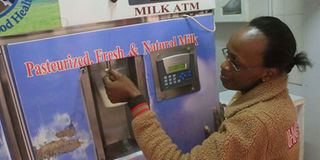High food prices will keep Kenyans from an early grave

Nancy Wambugu sells milk in Nyeri town on March 3, 2017. Kenyans are now contending with high food prices. PHOTO | JOSEPH KANYI | NATION MEDIA GROUP
What you need to know:
- Those consuming on the cheap are accustomed to cheating producers and ultimately undermining development.
- It takes real money to connect electricity to every shack and hovel so that people can see their poverty in its starkness every night.
Food is killing people, and not just because the prices for sukuma wiki, spinach, maize flour, milk, potatoes, cabbages, onions, sugar and maize flour is 21 per cent higher than it was last year, as the Kenya National Bureau of Statistics says.
A sharp increase in lifestyle diseases such as hypertension, diabetes, heart disease, cancer and obesity fingers food as the culprit.
Five years ago, for example, there were 453,745 people with hypertension.
Since Kenya attained middle income status in 2014, overeating has become a national epidemic because there is much more money than there is food to buy.
EMPLOYMENT
The ruckus about the rising cost of living and the spike in the price of maize flour, fat and sugar ignores the government’s responsibility to prevent citizens from committing suicide by eating.
Being a middle income economy is about consumption.
Shopping malls are not built for people who want to save money.
Thousands of kilometres of road are not tarmacked for peasants to descale their bare feet.
On average, every woman, man and child in Kenya makes Sh160,000 a year; or a monthly salary of Sh13,500 in what economists call per capita income.
Yet, the KNBS Statistical Abstract, 2016, shows that there are 2,477,955 Kenyans in wage employment.
As it were, the people earning a salary of Sh100,000 or more were 71,798 in 2016.
UNDERMINING DEVELOPMENT
If the government were to rely on taxing the fat pay cheques of 45,556 men and 26,242 women alone, it would raise a measly Sh25 billion in a year — hardly enough to fund the National Youth Service scandal.
A great majority of Kenyans — millions actually — do not wait on a pay cheque at the end of the month.
They make their own rain, and it pours in billions.
Farmers who grow maize, sugar cane, potatoes and rear dairy cows must be paid properly if they are to join the consistory of happy taxpayers.
Factor in transport, milling, packaging and profit, and it is no wonder food prices are going skywards.
Those consuming on the cheap are accustomed to cheating producers, workers, entrepreneurs, the tax collector and ultimately undermining development.
Other middle income nations’ citizens do not behave as if they are paid in bananas.
ECONOMY
Their people eat properly and generate tonnes of garbage; they sleep like royalty and go on holiday instead of retreating to their rural sticks whenever they take leave from work.
Their food prices are twice, thrice what Kenyans are whining about.
Cash from numerous side hustles is stashed under mattresses, and life lived on the cheap.
Hotels and restaurants cannot thrive among a people addicted to eating in roadside shacks where ugali sosa (free extra portion of pap) is treated as an entitlement.
Kenyans are still clutching onto poverty like a crutch in spite of their prosperity; they are wearing second-hand clothes handed down by dead white folk, and wallowing in the miniscule trade known as the kadogo (piecemeal) economy, which requires peasants to split a bean for dinner.
POVERTY HABITS
You cannot have your cake and eat it. Kenyans cannot be classified as middle income and still have its middle classes wolfing down curdled boiled blood, animal entrails and ugali sosa and still expect to ride bullet trains hurtling along the Standard Gauge Railway.
These poverty habits are the source of the country’s disease burden.
It takes real money to connect electricity to every shack and hovel so that people can see their poverty in its starkness every night.
Supplying laptops for every child perched on a stone in a blue-sky classroom does not come from charity.
Prevailing food prices are a favour because no one is being forced to eat.
As Mr Sowerberry of the Oliver Twist fame would say, “If you are fond of overeating, that’s your funeral; starve yourself by undereating, that’s your funeral.”





